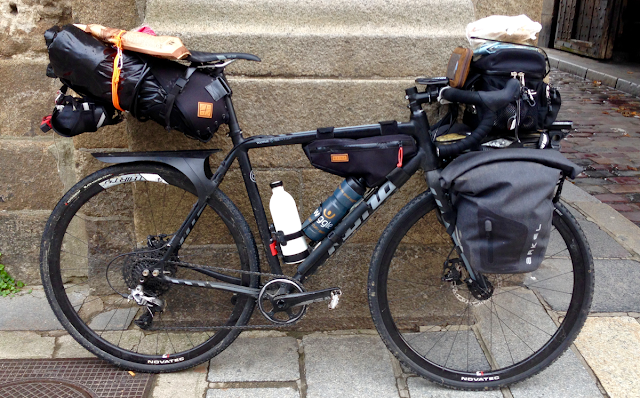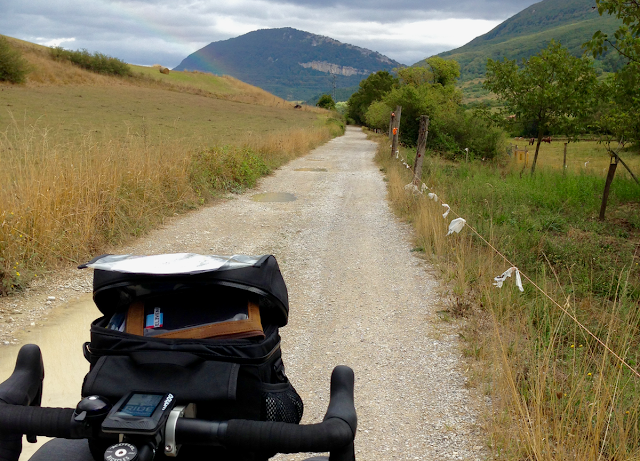The next in my
series of posts on Bikepacking, looks at some Top Tips for a good trip. These insights mostly originate from experiences enjoyed or endured on the '
Coasts and Cols' tour; everything from packing, to clothing and food. I hope you find them useful for your next tour...
- Pack light, but be prepared - The key to effective packing, is effective planning. You need to plan for possible scenarios; but weigh up the possibilities of those eventualities occurring, against the weight and bulk of the additional kit you'd require to deal with them. For example, cold or inclement weather when touring in the mountains, is a distinct possibility; the added weight and bulk of waterproof arm and leg warmers, and a proper GoreTex jacket, are well worth it. By contrast, you have to question whether you really need to take a full cutlery set to eat your dinner; or could you get away with just a spoon? Do you need to take a mug; or could you just drink from your stove pot? It is all about stripping back the unnecessary, but not compromising on kit that will keep you safe and comfortable.
- Pack weight evenly - Once you've stripped back your carry to the 'real essentials', consider carefully how you're going to pack them onto the bike. On the 'Coasts and Cols' tour, I opted to put heavier items like the tent, stove, fuel and other camping kit into my seatpack; then I put lighter items like clothes into my two small front panniers; with valuables in my handlebar bag, and food in my framebag - the bike felt very well balanced, and I could descend and climb with confidence.
 |
| The Kona Private Jake 'Fully Loaded' on the 'Coasts and Cols' tour |
- Wear natural fibres - When you're riding, go for the best quality modern fabrics like GoreTex; when you're off the bike though, consider wearing natural fibres like merino wool and cotton. Natural fibres are more resistant to odour build up, and they also feel nicer against the skin, especially after a day in tight fitting riding kit! Consider a merino or cotton shirt to wear in the evenings, and merino socks to wear at night.
- Insulate with down - For warmth to weight ratio, packable down jackets are unbeatable. However cold you have got on the bike, a down jacket and a wool beanie will soon have you on the road to recovering some body heat, once you set up camp for the night.
 |
| You'll be thankful of good insulation on mountain top wild campsites! |
- Take two of your most comfortable pair of bib shorts - Note the wording of this. On my last trip, I took one pair of Gore Bike Wear bib shorts, and one cheaper pair. By the second week, the padding in the cheaper pair had compressed, and they provided nowhere near the same comfort levels. If you know you have one particular pair of bib shorts that are super comfy, then it is worth investing in a second pair of the exact same short.
- Prepare, everything. - The less faffing and fiddling you can do when you're out on your trip, the better. Make sure you prepare all your kit, before you leave. A few examples I would pick out: cut out clothing labels - they might itch, fit tent inners to tent outers - to enable faster pitching, segment your panniers with waterproof bags - to avoid kit contamination, decant large bottles of product into small ones - don't take excess suncream/shower gel, plot routes onto paper maps in advance - don't do it in your tent with a headtorch on. The list goes on, but you get the idea; prepare your kit, to minimise wasted effort, and to maximise comfort.
- Eat before you're hungry (drink before you're thirsty) - Bikepacking is tough on your body - you're riding all day, and you're probably getting disturbed and/or reduced sleep and recovery. One thing that you can do to make it easier on your body, is to make sure it is correctly fuelled and hydrated. Have a read of my post "Top Tips for Bikepacking / Bike Touring Foods and Meals' for some ideas on what to eat; but also consider when you eat, and make sure you top up your levels of blood glycogen and water, before they dip too low.
- Carry spares - Every bit of additional weight you add, will make your riding a bit more laboured; but there is merit in carrying spares for potentially difficult situations. Things like a spare tyre, spare tubes, spare cleat bolts, spare tube patches, cable ties and spare brake pads, are all worth their weight in gold, when that unfortunate mechanical happens.
 |
| 'Mechanicals' happen. Take spares... |
- Expect the unexpected - Plot your routes before you leave; scope out the best roads and potential camping spots; aim to be in control, from the start. BUT, expect the unexpected... Plan contingency routes in the event of bad weather; consider passing through towns on your route, where you might be able to find an emergency hotel; at the very least, consider 'escape plans' e.g. a train. Anything can happen...
- Embrace the unknown - Last, but very definitely not least, I would say 'Embrace the Unknown'. Bikepacking is meant to be an adventure, and to some extent a test of adversity; don't worry if things go wrong, or plans need to be changed; embrace it, and you'll enjoy the whole experience a lot more!
 |
| Embrace the road less travelled... |










It's my next challenge / ambition to have an adventure like this. It means a new bike though and that may take some convincing the wife.
ReplyDelete